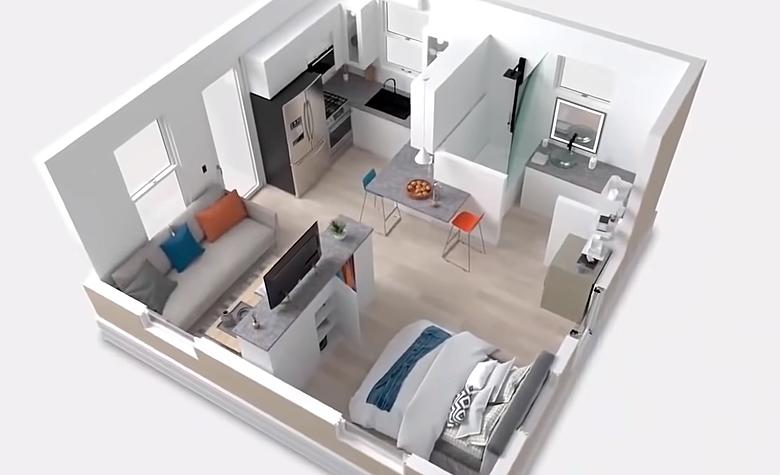Tesla Homes With Solar And Wind Power House On Fire During Hurricane Event
Tesla Homes With Solar And Wind Power House On Fire During Hurricane Event
Blog Article
Tesla Homes Built For The Future Home For Sustainable Living

Tiny home dwelling continues to achieve reputation, drawing individuals in search of affordability, simplicity, and sustainability. However, there are quite a few authorized concerns for tiny home residing that should not be overlooked. As individuals transition into this minimalist way of life, it is important to navigate the complexities of zoning legal guidelines, constructing codes, and land use laws.
Zoning legal guidelines dictate how land can be utilized in a specific space, affecting the place tiny homes may be positioned. In many municipalities, conventional zoning rules don't account for the distinctive nature of tiny homes. This inconsistency can result in challenges when making an attempt to put a tiny home on lots. Some regions might permit tiny homes as accessory dwelling units, while others could strictly prohibit them.
Building codes are one other essential side of tiny home residing. These codes set forth requirements for the development of homes to make sure safety, habitability, and structural integrity. Tiny homes, often constructed on trailers or as prefabricated items, could not meet typical constructing codes. It is significant to verify whether native authorities acknowledge tiny homes and what specific codes apply to them.
Tesla Homes With Sustainable Architecture House On Fire During Hurricane Event
Permitting is a necessary step before relocating a tiny home. Homeowners must acquire the appropriate permits to ensure compliance with local laws. This permit process can range significantly by state or locality and may involve inspections and fees. Failure to secure the necessary permits can result in fines or the shortcoming to reside within the tiny home.
Land concerns play a major function in tiny home legality. Many folks select to park their tiny homes on personal property, whether it be a family member's land or a designated tiny home community - Tesla Homes With Battery Storage. Understanding property rights and lease agreements turns into imperative in these situations. Additionally, it’s crucial to verify whether or not the chosen land is zoned for residential use.
Homeowners should also contemplate homeowners associations (HOAs) if residing in areas ruled by these organizations. HOAs usually have strict guidelines regarding residential constructions and aesthetics. Tiny homes might not adjust to these regulations, which can result in conflicts. It is advisable to seek the advice of the HOA guidelines earlier than proceeding with tiny home plans to avoid disputes.
Tesla Homes With Solar And Wind Power Newly Released $10,000 Tiny House

Financing options pose another challenge. Many financial establishments are hesitant to provide loans for tiny homes as a outcome of their unconventional nature. Understanding alternative financing avenues, similar to personal loans or specialized lenders who cater to tiny homes, is crucial. Exploring these options might help potential owners make informed decisions and safe funding.
Insurance presents one other legal avenue for tiny home dwelling. Obtaining insurance coverage for a tiny home can differ broadly from commonplace owners insurance coverage insurance policies. Due to their distinctive constructions, many firms could not present coverage, or they could require particular endorsements. Finding an insurer knowledgeable about tiny homes might help mitigate risks associated with injury or liability.
Tesla Homes And Solar Innovations Fully Furnished House Available For Purchase
In addition to local laws, federal laws might affect tiny home residing. Regulations from the Department of Housing and Urban Development (HUD) define requirements for cell and manufactured homes. If a tiny home is built on a permanent foundation, it may need to fulfill these requirements. Compliance with federal guidelines can differ based on a home’s classification.
One emerging option for tiny home dwelling is placement in tiny home communities. These specialized developments typically cater to the tiny home way of life, providing dedicated area and shared facilities. However, this doesn't remove the necessity for cautious consideration to native laws. Each group might have its own set of tips, leases, and obligations that residents must adhere to.
Building sustainable and self-sufficient living arrangements also requires compliance with environmental laws. Tiny home builders often aim to use eco-friendly materials and decrease their carbon footprint. However, relying on the placement, there could additionally be legal guidelines relating to waste disposal, water use, and power consumption that influence how tiny homes can be designed and lived in sustainably.
Legal issues lengthen past building and zoning. Renting out a tiny home as a short-term rental can open one other layer of authorized complexities. Understanding local rental laws, occupancy limits, and business licenses is essential for anybody trying to monetize their tiny home. Lawful practices might help avoid penalties or potential litigation from regulatory authorities.
Tesla Homes With Eco-Friendly Designs Modern Open Concept House Design
As the tiny home motion evolves, advocacy teams work to deal with many of those authorized issues. They purpose to teach policymakers about the benefits of allowing extra versatile zoning and constructing codes to accommodate tiny homes (Tesla Homes With Advanced Energy Storage). Engaging with local advocacy organizations may help be positive that the voice of tiny home dwellers is heard and revered in discussions concerning housing policy.
Community outreach is vital for overcoming legal challenges in tiny home dwelling. Building relationships with neighbors and native authorities can foster understanding and cooperation. Providing details about tiny home benefits, such as affordability and minimal environmental influence, can pave the finest way for eventual acceptance.
Ultimately, navigating the authorized landscape surrounding tiny home living requires diligence and preparation. An in-depth understanding of local laws, codes, and laws is important for establishing a profitable and sustainable tiny home lifestyle. By conducting thorough research and making certain compliance with all authorized concerns, potential tiny owners can considerably improve their possibilities of a smooth transition into this new way of living.
The increasing allure of tiny homes comes with its share of complicated authorized challenges. As extra people pursue this simplified life-style, it turns into crucial to remain knowledgeable and proactive relating to the legal guidelines that govern land use, development, and tenancy. Being educated on these matters allows for a more seamless integration into the tiny home community, ensuring residents can maximize the benefits of living within a smaller footprint.
Tesla Homes For Sustainable Living Home For Sustainable Living
Tiny home living offers an revolutionary answer to present housing challenges, but it doesn't come with out its obstacles. Legal issues for tiny home residing embody varied features, from zoning legal guidelines to insurance coverage and community compliance. Addressing these factors More about the author with a comprehensive understanding can facilitate a smoother journey into the world of tiny homes.
In summary, embracing the tiny home lifestyle necessitates a thorough examination of the various legal issues that accompany it. Awareness of native legal guidelines, building codes, and group laws can significantly impact the success of a tiny home venture. With the right approach, tiny home living could be a fulfilling and legally compliant choice. By educating oneself and fostering optimistic neighborhood relationships, people might help shape the future of tiny home living in a legally sound method.
- Understanding zoning legal guidelines is essential; totally different municipalities have varying regulations that can impression the place tiny homes could be placed.
- It's essential to find out if the tiny home qualifies as a everlasting residence or an RV, as this distinction impacts building codes and permits.
- Research local constructing codes to make sure compliance; many areas have specific requirements concerning measurement, safety features, and development materials.
- Investigating land use rules may help avoid conflicts with neighbors and ensure the tiny home neighborhood adheres to local guidelines.
- Address potential title points when purchasing land; some tiny homes are classified as private property, whereas others could also be real estate, impacting financing choices.
- Consider the influence of homeowner affiliation (HOA) guidelines that may limit tiny home dwelling or impose additional necessities for homes within their jurisdiction.
- Insurance insurance policies for tiny homes differ considerably; obtaining the proper coverage can protect in opposition to liabilities and damages that conventional householders face.
- Evaluate utility hookups and rules associated to water, sewage, and electricity to ensure that the tiny home can be correctly serviced.
- Be aware of property tax implications; the classification of the tiny home can affect tax duties and local assessments.
- Stay informed about potential adjustments in laws, as laws governing tiny homes are evolving and may vary considerably over time and location.
What zoning legal guidelines apply to tiny homes in my area?undefinedZoning laws range significantly by location. It's important to check along with your local planning division to understand whether or not tiny homes are permitted and if any specific laws apply.
Tesla Homes For The Green Energy Revolution House That Comes With A Battery
Do I need a constructing permit for a tiny home?undefinedMost municipalities require a building allow for developing or putting a tiny home on a permanent foundation. Temporary constructions or RVs might have completely different rules, so confirm with local authorities.
Can I park my tiny home on my property?undefinedParking rules depend upon local zoning legal guidelines and land use policies. Ensure your property is zoned for residential use, and verify any HOA rules if relevant.
Are tiny homes considered as everlasting housing?undefinedTiny homes can be categorised as either everlasting or temporary housing. If they're on a foundation, they sometimes are seen as permanent dwellings; otherwise, they might fall beneath RV rules.
What are the utility hookup requirements for tiny homes?undefinedUtilities corresponding to water, electricity, and sewage must adjust to local codes. Check with utility suppliers and local laws to make sure proper installations and connections.
Tesla Homes With Solar-Powered Living Spaces Modern Open Concept House Design
How do I finance a tiny home legally?undefinedFinancing options for tiny homes range. Some lenders supply loans for tiny homes on foundations, whereas others think about them RVs. Research financing options particular to your tiny home's classification.
Will my tiny home need to satisfy building codes?undefinedIf your tiny home is classed as a permanent dwelling, it should meet applicable constructing codes. Always seek the advice of native building authorities to make sure compliance during development.
Tesla Homes For The Green Energy Revolution House On Fire During Hurricane Event
Can I use my tiny home as a rental property?undefinedShort-term rental regulations would possibly apply should you intend to hire out your tiny home. Familiarize yourself with local rental legal guidelines and acquire necessary permits to keep away from fines.
What are the tax implications of owning a tiny home?undefinedTax implications can range based mostly in your location and the classification of your tiny home. It's advisable to consult a tax professional to grasp property taxes and potential deductions.
Are tiny homes subject to local housing regulations?undefinedYes, tiny homes could additionally be subject to housing rules, especially if they're categorized as everlasting residences. Review your local housing codes article to make sure compliance with safety and habitability requirements.
Report this page